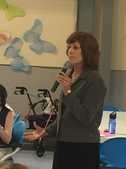|
It’s not that I am a worrywart or a pessimist; I just cannot help anticipating what might come next. That’s the way the minds of nurses and doctors work. Spending years in the health field, a good nurse and doctor will always be planning for the next step or considering the “just-in-case.” You have a care plan for your patients, and you make sure all the next measures are in place. You stock up on equipment for emergencies; you make sure the equipment is ready and the medications have not expired. Would you want to be the patient in cardiac arrest when the batteries in the defibrillator have not been charged? That was my pet peeve. As charge nurse, I was compulsive about my staff performing checks on the emergency equipment.
You tend to transfer this same mentality into everyday life. I cannot help but anticipate what we might need: whether it’s for a day trip to NYC, two weeks in Europe or we head out for the mountains on a hiking trail. My family makes fun of me – as I pull out of my purse or backpack exactly what they need. We hiked Mt. Washington years back with several families – sleeping in the huts along the Appalachian Trail. You can only imagine my backpack contents! In addition to my crystal aspirin (in case of a heart attack) and supplies to prevent hypothermia (even though it was July, Mt. Washington’s weather is erratic), I pulled out a water filter when we discovered that the ranger station that we counted on being open was closed. We had planned to fill our water bottles there, along the 10-hour trek on a hot July day, but now we only had untreated water in the bathrooms. We utilized my water filter for the entire group and drank fresh water, and enjoyed the boost in our blood sugar with the chocolate treats that I had stuck in my backpack – just in case. So what does this subject have to do with the pandemic? Everything. The mindset of health professionals (not just nurses and doctors) is different from the rest of the planet – certainly unlike those of politicians or economists. We cannot help but anticipate, and we really become irate when surrounded with unpreparedness for emergencies. What we are experiencing with this pandemic is disrespect for the health profession. The world is paying a price for that. There are so many lessons to learn from this pandemic, but I truly hope this lesson is one of them. I have served in the health profession as a clinical nurse specialist for decades, and so I was driven to write about this subject, given the severity of what we are experiencing. What has this pandemic revealed?
I’ll end with my favorite quote, which is supposedly an old cowboy motto, once used by Winston Churchill: “Speak the truth but ride a fast horse.” (You might see me riding my fast horse out of town!) Charlotte Michos is a clinical nurse specialist who values personal-centered care and serves as a Healthcare Consultant in helping others make informed decisions. For more information, email her or call (845) 548-5980.
0 Comments
Your comment will be posted after it is approved.
Leave a Reply. |
Please check back often.
© 2022 Charlotte Michos. LLC All rights reserved. Please contact Charlotte for permission to republish. Archives
March 2022
Categories |


 RSS Feed
RSS Feed